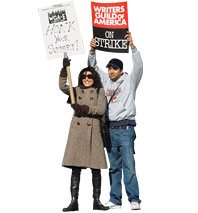
‘As if the Grinch really had stolen Christmas, children cried and parents were crestfallen.” That’s the opening line from a Times article on Broadway’s stagehands’ strike—and it doesn’t get much cheerier from there. During last week’s simultaneous shutdowns (ideally, both will be resolved by the time you read this, with smiles and hugs all around), coverage of the Writers’ Guild of America strike was all about Tina Fey on the picket line and Jay Leno handing out doughnuts, while the Grinchy stagehands were swiping Christmas dreams from weeping kids. Of course, journalists are naturally going to be sympathetic to other writers (even those whose salaries they covet)—but shouldn’t everyone else be cheering the stagehands union and scorning the Writers’ Guild? Stagehands do honest, sweat-of-the-brow work, while TV writers sit around wadding up paper balls and thinking of something funny for Stewie from Family Guy to say. But, anecdotally at least, people felt the opposite. Mention the writers’ strike and you were soon discussing issues like Internet streaming; mention the stagehands and someone would invariably sputter, Did you know they make $150,000 a year?! (A figure the union is happy to debunk—see here.)
This sympathy disparity might be owed to the fact that, whatever your politics, the writers’ strike feels vaguely progressive and futuristic (fair compensation in a digital world) while the stagehands’ strike felt vaguely retrograde and obstructionist (like last week’s French transit strike). Or it might be because Local One deprived us of something tangible and immediate (Jersey Boys) while the WGA deprived us of something theoretical and faraway (a new season of Lost). We’d no doubt be less patient with the WGA stoppage if our TVs suddenly shut down altogether.
Or maybe there’s a different explanation: The stagehands chose the wrong way to pitch their plight to New Yorkers. “Unions, like any social movement, have to get a message out,” says Judith Stepan-Norris, a sociology professor at UC Irvine. And, she explains, there are typically two ways to frame that message: as a story of injustice or as a story of imbalance. The injustice argument is that “these are hardworking people who aren’t getting the basic necessities.” The imbalance argument “is less to do with how much compensation you’re getting but whether or not you’re fairly compensated.”
The writers’ case from the start has been, Sure, we make loads of money, but relative to what our work generates, we’re getting screwed. The stagehands, by contrast, framed their battle as a classic little-guy- versus-the-fat-cats injustice. “Unlike the producers, we are not fighting for our second or third homes: We are fighting to keep the one we have,” reads a Local One flyer. A moving argument—until it was undercut once people heard about their paychecks. The writers made sure that dollars weren’t the main issue. “In this era of heightened income inequality and status anxiety, a lot of people see the writers’ strike as a fight for creative people to get their due,” says Daniel Cornfield, a Vanderbilt professor and editor of Work and Occupations. Wait—income inequality? Status anxiety? No wonder the WGA fight struck a nerve in New York. By this logic, the stagehands are better off refocusing on Broadway’s record-breaking profits—as they started to do last week. “They should frame this as not about making ends meet but about getting their fair share,” says Vincent Roscigno, a Bronx-born sociology professor at Ohio State. “That will resonate with the public more than ‘We’re just like you.’” Still, he says, they have a PR hill to climb. And he should know—he just canceled a trip to New York for Thanksgiving to take his kids to The Lion King.

SEE ALSO:
• Some Key Numbers in the Stagehands’ Strike
• What’s Worth Seeing When Broadway’s Dark?